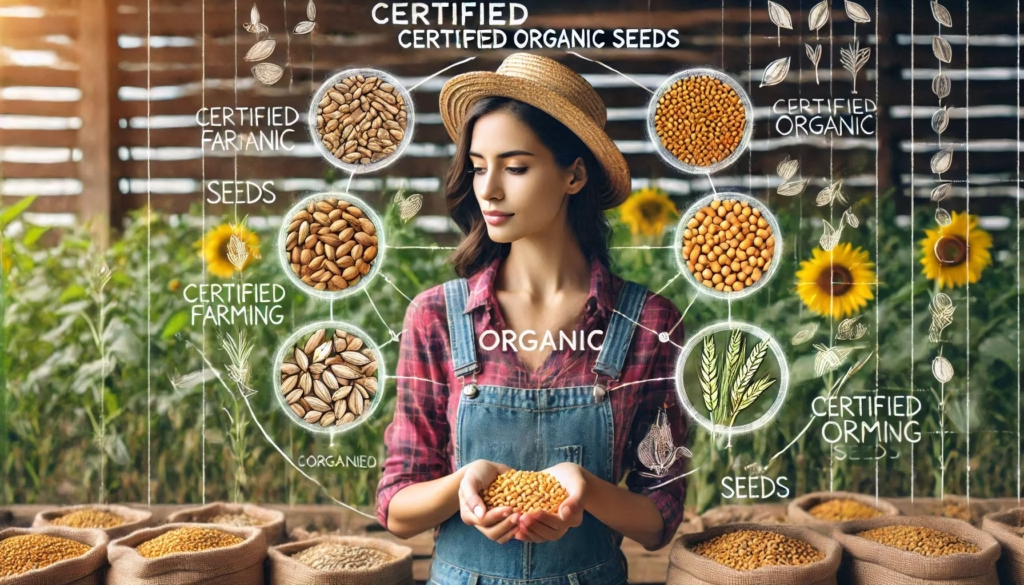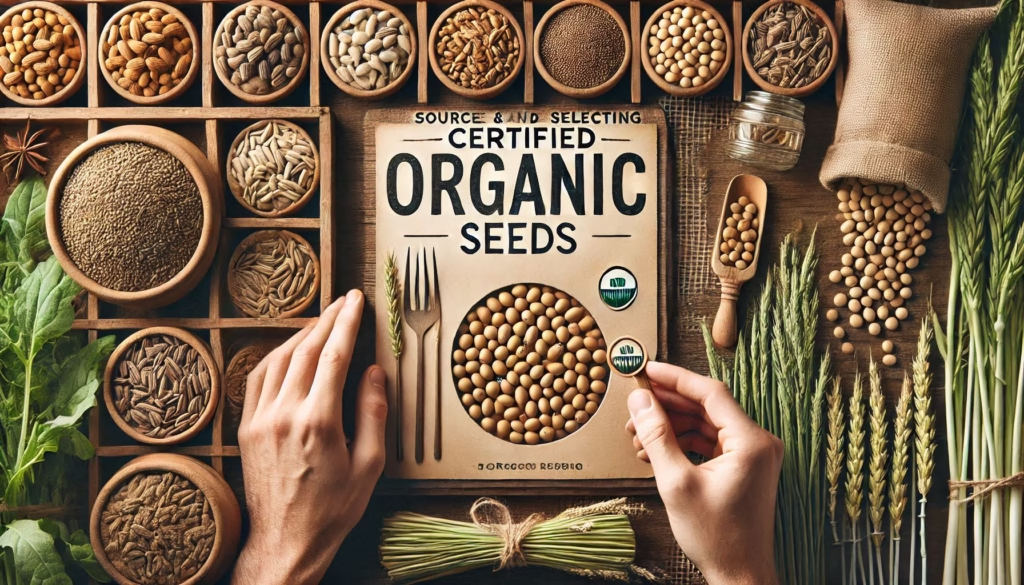Choosing the right seeds is one of the most critical decisions for any farmer, especially for those practicing organic farming. Organic seeds align with sustainable farming principles and ensure that your crops grow without exposure to synthetic chemicals from the beginning. This blog will guide you through sourcing and selecting certified organic seeds for your farm, helping you lay a strong foundation for a successful growing season.

What Are Organic Seeds?
Organic seeds are produced through natural farming methods that avoid synthetic fertilizers, pesticides, and genetic modification. They come from plants grown in certified organic systems, ensuring compliance with organic standards. These seeds are better suited for organic farming environments as they are often bred for disease resistance, nutrient efficiency, and adaptability to local conditions. Organic Seeds.
Why Choose Organic Seeds?
1. Compliance with Organic Certification
Using certified organic seeds is a requirement for farmers aiming to achieve organic certification for their produce. It ensures that your farm meets the standards set by regulatory bodies.
2. Healthier Crops
Organic seeds are bred for resilience and adaptability, making them more likely to thrive without synthetic inputs.
3. Environmental Benefits
Organic seed production promotes biodiversity, reduces chemical usage, and supports sustainable farming practices.
4. Better Market Value
Produce grown from organic seeds often commands higher prices in the market, appealing to environmentally conscious consumers.
How to Source Organic Seeds

1. Certified Organic Seed Suppliers
Start by identifying suppliers that specialize in certified organic seeds. Look for:
- Reputable Brands: Check if they are certified by recognized organic certifying bodies such as USDA Organic, IFOAM, or other regional organizations.
- Transparency: Suppliers should provide information about their seed sources and breeding practices.
2. Local Seed Banks
Local seed banks often stock organic seeds adapted to your region’s specific climate and soil conditions. Supporting local seed banks also promotes community resilience.
3. Online Resources
Many reputable companies offer organic seeds online. Some popular options include Johnny’s Selected Seeds, Seed Savers Exchange, and High Mowing Organic Seeds. Ensure the seeds you order are certified organic and suitable for your farming needs.
4. Farmer Exchanges
Networking with other organic farmers can be an excellent way to source seeds. Many farming communities organize seed swaps or exchanges, providing access to locally adapted organic seeds.
Factors to Consider When Choosing Organic Seeds
1. Certification
Always verify that the seeds are certified organic. Look for labels from recognized certifying organizations to ensure they meet organic standards.
2. Crop Variety
Select seed varieties that align with your farming goals. Consider:
- Climate Adaptation: Choose seeds bred for your local climate conditions.
- Pest and Disease Resistance: Opt for varieties known for their resilience to common pests and diseases.
- Yield Potential: Ensure the seeds you select offer high yield potential without compromising quality.
3. Seed Quality
High-quality seeds are essential for a successful harvest. Check for:
- Germination Rates: Look for seeds with high germination percentages.
- Purity: Ensure seeds are free from contaminants or other crop varieties.
- Freshness: Use seeds from the most recent harvest season to ensure viability.
4. Organic Breeding Practices
Some organic seeds are bred through traditional open-pollination methods, while others use hybrid techniques. Choose seeds that align with your values and farming objectives:
- Open-Pollinated Seeds: Allow farmers to save seeds for future planting.
- Hybrid Seeds: Offer specific traits like disease resistance or higher yields but cannot be saved for future use.
Best Practices for Managing Organic Seeds
1. Proper Storage
Store seeds in a cold, dry, and dark location to keep them viable. Airtight containers and temperature-controlled environments are ideal for long-term storage.
2. Seed Testing
Before planting, test a small batch of seeds for germination to ensure they are viable. This practice helps avoid wasted effort and resources.
3. Seed Saving
If you use open-pollinated seeds, consider saving seeds from your healthiest plants for future planting. Ensure the plants are isolated from other varieties to maintain genetic purity.
Challenges in Using Organic Seeds
1. Limited Availability
Organic seeds for certain crops may be harder to find, especially for niche or specialty varieties. Planning and early ordering can help mitigate this challenge.
2. Higher Costs
Organic seeds can be more expensive than conventional ones due to their specialized production methods. . But frequently, the long-term advantages outweigh the initial outlay.
3. Learning Curve
Adapting to organic farming practices requires knowledge and experience. Farmers new to organic systems may face a learning curve in selecting and managing seeds.
Benefits of Using Organic Seeds
1. Enhanced Crop Quality
Organic seeds produce crops with superior flavor, nutritional value, and overall quality, making them highly desirable in the market.
2. Sustainability
Using organic seeds contributes to a more sustainable farming ecosystem by reducing dependence on synthetic inputs and preserving biodiversity.
3. Consumer Trust
Growing crops from organic seeds builds consumer confidence, as the produce meets stringent organic standards from seed to harvest.

Conclusion
One of the most important steps in successful organic gardening is selecting and obtaining organic seeds. By selecting certified seeds, considering local adaptability, and following best practices for seed management, farmers can ensure robust and sustainable harvests. Organic seeds not only support the principles of organic agriculture but also pave the way for a healthier planet and more resilient farming systems.
Are you ready to take the first step in your organic farming journey? Start by sourcing the best organic seeds and planting the seeds of sustainability today!
Here are the top questions to ask people on organic farming, and related topics.
1. What are organic seeds, and how are they different from conventional seeds?
Organic seeds are grown without synthetic fertilizers, pesticides, or genetic modification. They are bred in certified organic systems, ensuring they align with sustainable farming practices. Conventional seeds may be treated with chemicals or derived from GMOs, making them unsuitable for organic farming.
2. Why are certified organic seeds essential for organic farmers?
Certified organic seeds are necessary for compliance with organic certification standards. They ensure crops are free from synthetic chemicals from the start and are bred for resilience and adaptability, performing well in organic systems. This certification builds consumer trust and ensures market credibility.
3. Where can farmers source organic seeds?
Farmers can source organic seeds from certified suppliers like Johnny’s Selected Seeds or High Mowing Organic Seeds, local seed banks, farmer exchanges, or reputable online platforms. Choosing regionally adapted seeds from local sources enhances crop success.
4. What factors should farmers consider when choosing organic seeds?
Farmers should prioritize certification, climate adaptability, pest and disease resistance, and seed quality (germination rates, purity, and freshness). Aligning seed selection with farming goals ensures higher yield and sustainability.
5. What challenges do organic seeds present?
Organic seeds may have limited availability, higher costs, and require a learning curve for new organic farmers. Early planning, networking, and continuous education can help overcome these challenges effectively.




Can you be more specific about the content of your article? After reading it, I still have some doubts. Hope you can help me. https://accounts.binance.com/es-MX/register-person?ref=JHQQKNKN
Understanding game fundamentals is so key, especially account security! Building that foundation early prevents headaches later. I was checking out resources like jljl7 login – a solid start for new players learning the ropes & responsible gaming! 🤔